#fremdsprache
Text
30. September und andauernd, noch
-ieux oder -eille, ich werde es bestimmt noch verstehen
Der Sohn erzählt mir, dass er nun wieder Spanisch lernt. Mit einer App. Er hat die Möglichkeit, mit einer Organisation in ein paar Monaten nach Peru zu fahren. In der Schule hat er bis vor ungefähr einem Jahr Spanisch gelernt, das will er dafür wieder auffrischen.
Von Freunden und aus den Berichten im Techniktagebuch kenne ich Duolingo und nehme an, dass er Spanisch also damit lernt. Aber er sagt, dass er da eine andere App habe, Busuu. Und die sei ganz gut. Er erzählt mir, dass es eine Funktion gibt, mit der man Lösungen und Aufnahmen von sich an Muttersprachler senden könne, und die würden das dann korrigieren, und gleichzeitig bekomme man Lösungen und Aufnahmen von anderen, die gerade deutsch lernen, und würde die im Gegenzug korrigieren. Das finde ich einen spannenden Communitygedanken und möchte mir das gerne angucken.
Mit Sprachen hab ich es nicht so. Englisch habe ich beruflich mal sehr intensiv gesprochen, in den letzten Jahren ist das aber ziemlich eingerostet, seit ich es nur noch als Fachsprache und nicht mehr als Umgangssprache benutze. Und meine französischen Sprachkenntnisse... naja. Die waren immer äußerst bescheiden. Mein Französisch als “eingerostet” zu beschreiben wäre sehr euphemistisch.
Während mein Wortschatz im Französischen durch meine Lateinkenntnisse und auch, weil ich mal eine Zeit lang häufiger in Paris war, vielleicht gar nicht so schlecht ist, sind Grammatik und Rechtschreibung des Französischen mir immer ein Rätsel. Diese französische Eigenschaft, die letzten Buchstaben des Wortes einfach wegzulassen und man muss dann halt wissen, ob da noch ein t, ein s, ein e oder sonst was für ein Buchstabe kommt, und wie die Striche auf und unter den Buchstaben zu verteilen sind, hat nicht so richtig zu meiner Freundschaft mit dem Französischen beigetragen.
Ich überlege kurz: Welche Sprache könnte ich mir also mit Busuu angucken? Englisch wieder vertiefen, Französisch endlich mal "richtig" lernen, oder eine ganz andere? Dänisch, das ich ein ganz klein wenig kann und das ich gerne vertiefen würde, ist auf Busuu leider nicht verfügbar.
Ich registriere mich und wähle aus, dass ich ca. 10 Minuten am Tag Französisch lernen möchte, nur mal ein paar Tage lang, um mir das anzugucken.
Aber sofort bin ich in den Fängen der Gamification. Es ist toll, ich bin in einer Liga, und wenn ich fleißig lerne, steige ich in eine höhere Liga auf! Und nun aber dran bleiben, sonst rutsche ich wieder ab! Und, tatsächlich, ich soll Sätze schreiben und nachsprechen, und dann bekomme ich von Muttersprachler:innen Korrekturen und ermutigende Kommentare. Das ist wirklich sehr nett, manche verteilen sehr großzügig Kommentare, dass meine fehlerhaften Antworten “Parfait” seien, aber andere geben sich richtig Mühe, mich zu korrigieren:

Screenshot aus Busuu, natürlich mit schönen Bildern
Ich kann mich dann wiederum bedanken, indem ich Daumen hoch für die Antworten verteile oder eine Antwort als “Beste Antwort” auszeichne - das gibt dann wieder Punkte für die Antwortenden, um in der Liga aufzusteigen.
Ich spreche auch Sätze nach, meine Aussprache wird von einer Spracherkennung beurteilt, und nehme eigene Antwortsätze auf, die dann wiederum in die Community gehen, die die Sätze und meine Aussprache korrigiert. Und andersherum revanchiere ich mich natürlich, indem ich Deutschlernende ermutige und korrigiere.
Wer bis hierhin gelesen hat, wird den Gedanken verstanden haben und so neu ist der ja wahrscheinlich auch gar nicht, aber ich finde das irgendwie toll: Fast jede:r ist ja irgendwie mehr oder weniger Expert:in in der Muttersprache, und ich bekomme ermutigendes Feedback, dass Muttersprachler:innen meine holprigen Sprachbemühungen verstehen können!
Jetzt muss ich nur dran bleiben. An vielen Tagen schaffe ich nur das absolute Minimum, eine Minilektion, aber auch das ist wichtig, damit mein Streak nicht abreißt:
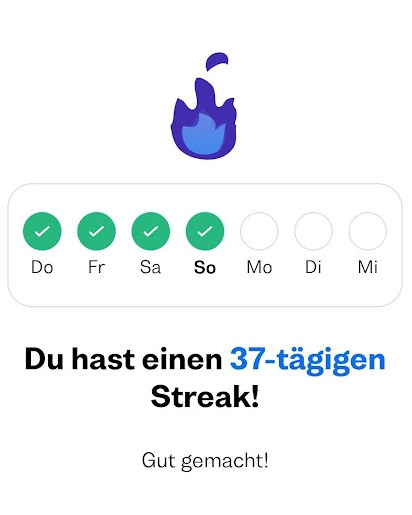
Screenshot aus Busuu: 37 Tage schon täglich eine kleine Französisch-Lektion, "Gut gemacht!", finde ich auch
(Molinarius)
7 notes
·
View notes
Text
Dialekt - Heimatgefühl oder Stimmungskiller
„Bled deaf ma scho sei, man muaß se bloß z’häifa wissn.“
Na, wer hats verstanden? Doch wie verhält es sich bei einer Session? Heimatgefühl oder Stimmungskiller?
Viele Begriffe werden während eines fesselnden Abenteuers auf Englisch ausgesprochen, weil sie im Deutschen selten im Sprachgebrauch vorkommen und deshalb seltsam klingen können. Wie verhält es sich, wenn die Begriffe nicht nur in Deutsch, sondern im Dialekt ausgesprochen werden. Heimatgefühl oder Stimmungskiller?
Continue reading Untitled

View On WordPress
#Allgäu#allgäuerisch#bairisch#Bayern#deutsch#Dialekt#Drag#Englisch#Fremdsprache#Geilheit#Heimat#Heimatgefühl#Heimatverbundenheit#Hochdeutsch#Hotel#Lost in Translation#Mundart#Platt#Queen#Sächsisch#Schwaben#schwäbisch#Spaßbremse#Sprache#Stimmung#Stimmungskiller#Translation#Übersetzung#Verständnis
2 notes
·
View notes
Link
0 notes
Photo

Schulprogramme im Ausland – Reiten, fliegen, Kajak fahren und nebenbei spielend leicht Englisch lernen
(Ferien-)Schulprogramme im Ausland: Reiten, fliegen, Kajak fahren und nebenbei spielend leicht Englisch lernen – hier ein paar Tipps!
0 notes
Text
Nikt nie domyśla się jak źle ze mną jest
-Janette
#polnische sprüche#Polnisch#Fremdsprache#gebrochenes herz#sprüche über drogen#drogen sprüche#trauma#trauer
0 notes
Text
Das wird wahrscheinlich auch so kommen. #DeepL ist doch jetzt schon aus vielen Büros nicht mehr wegzudenken. Die logische Weiterentwicklung wird da sicherlich ein maschineller Simultanübersetzer werden. #KI #ML #AI #Fremdsprache
0 notes
Text
voll tragisch dass ich kein Dialekt sprechen kann... also nicht kein Dialekt wie Ich Spreche Perfektes Hochdeutsch sondern ich kann halt nicht dieses extreme wo Leute die nicht von hier sind super Probleme haben einen zu verstehen.
Ich mein ich versteh ja schon warum meine Eltern nur Hochdeutsch mit mir gesprochen haben (denen wurde es in der Schule komplett verboten / wurden geschlagen dafür, es gibt immernoch Vorurteile bzw man wird als dumm abgestempelt wenn man Dialekt spricht), aber jetzt kann ich es halt höchstens noch als Fremdsprache lernen irgendwie und das ist schon cringe
Anyways bringt euren Kindern Dialekt bei wenn ihr es könnt, Hochdeutsch kommt in der Schule dann eh dazu
#Also nicht ganz wie eine Fremdsprache weil ich es schon im großen und ganzen verstehen kann#aber hab es halt nie selbst gesprochen und es würde voll fake klingen wenn ich es probieren würde#doddie redet#german stuff
10 notes
·
View notes
Text
What I learned after doing Duolingo, Busuu, Clozemaster and Babbel lessons every day for 60 days
So, a few months ago I realized my skills in German actually suck because I'd been using A1 language most of the time (I teach beginners up to B1 level), and I had not been reading or listening to spoken German other than movies and series. As a result, imposter syndrome and terrible self-esteem hit me really hard, and I decided to take action. At the moment, I can't afford conversation classes or a German course to get my B2 certificate (and I clearly wouldn't pass a B2 test). I had been doing Duolingo for years and I managed to achieve a streak of 784 days, but the German lessons were too boring for me (I had finished the entire German course, but they added new content). I didn't want to lose my streak, so I decided to start another language there just for fun (I was tired of Spanish as well), then I chose Italian, and it's been amazing so far.
After searching for some materials online, I decided to download Busuu again. I took a placement test and they told me to do the B2 course. However, I felt like I needed a recap on some topics, so I started B1 course there (I'm finishing this week!) and it helped me a lot. Interacting with others while having your exercises corrected is actually great, so as correcting people's exercises. Besides, I started a list on Quizlet to help me memorize new words and expressions.
As for Babbel, I paid for one year of German because the price was really good, and they sent me to B2 as well. I finished all the B2 contents and did the B1 courses as well, and they gave me two live classes for free. I was terrified of participating in them because I wasn't very confident I could speak to foreigners, but I did it and it was really nice. The teacher and the other participants were amazing, and the cultural exchange was very beneficial.
I discovered Clozemaster after interacting with a polyglot girl I follow on Instagram. It may be simply "fill-in-the-blanks", but it really helped me memorize some structures and also review stuff I hadn't seen in a long time.
I was feeling so awful before that I considered quitting German and doing something else (new information: I monetized my hobby and now I hate my life lol), and of course the impossibility of moving to Germany made me feel even worse. I can't apply for DAAD scholarships because I am not interested in academic studies at the moment, PLUS, I'm not getting any younger... A friend and former student recommended the Bundesfreiwilligendienst, and I am doing lots of research on that.
In conclusion, after doing all this for the past 60 days, I felt that I really improved my writing and listening skills (I had also stopped watching German tv shows because this made me really sad). I've been also searching for upper-intermediate books that can help me until I can pay for a course. Maybe next summer I'm going to Berlin for an exchange program, and then I'll try to travel to other cities and speak German there as much as I can.
#language learning#language study#studying german#deutsch als fremdsprache#language learning problems#frustration#imposter syndrome#duolingo#babbel#busuu#clozemaster#deutsch#deutsch lernen#langblr
4 notes
·
View notes
Text
Literally dying why is Blockveranstaltung the worst thing anyone has ever invented
#vladi speaks#KOPFSCHMERZEN. ICH HAB KOPFSCHMERZEN. UND WIR HABEN NOCH 30 MIN REFERAT + 30 MIN DISKUSSION VOR UND#und außerdem. kenne ich den Kommilitonen. und der spricht deutsch als Fremdsprache. SCHLECHT. und. ich kann ninma.#hätte morgens dafür die Energie gehabt aber. nicht nach stunden referat mit Fett Migräne und Maske und Rückenverspannung und Brustschmerzen#WHY DOES THIS HAVE TO HAPPEN SO
7 notes
·
View notes
Photo

die belgischen Kollegen
#irgenwie süß dass sie sich die mühe gamcht haben einen text zu schreiben der wie deutsch als fremdsprache klingt#mord mit aussicht#ep: das nennt man camping#übrigens eine der besten episoden
9 notes
·
View notes
Text
Hi! I've created an instagram account to teach German as part of a master's course and I'll be posting stuff over the next few months 🥰 Feel free to follow me there and share it 🥺
https://www.instagram.com/astridaufdeutsch/
#i hope it won't be a mess#i'll probably delete this later today or tomorrow#langblr#langblr german#german language#deutsch als fremdsprache
12 notes
·
View notes
Text
Deutschribing Germany
Education
Education in Germany is free and compulsory between ages six and sixteen. States (Länder) are largely responsible for education, with the federal government playing a minor role.
Types of schools
The vast majority of children attend state schools, but there are private schools (Ersatzschulen) as well. The latter have very low tuition fees and are also subsidized by the state, which effectively makes them privately-run schools funded by the state. Some are run by religious groups.
School terms
The school year is divided into two terms (from August to January and from February to July) and starts after the summer break, which differs from state to state but usually finishes in mid/end-August. Children have twelve weeks of vacation in addition to public holidays. Exact dates differ between states, but there are generally six weeks of summer vacation, two around Christmas, two around Easter, and two in the fall during the harvest season, since farmers used to need their children for field work.
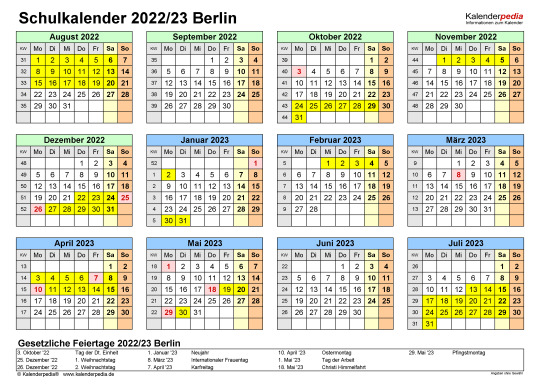
Grades
The German grading system is as follows, from highest to lowest: sehr gut (1.0–1.5), gut (1.6–2.5), befriedigend (2.6–3.5), ausreichend (3.6–4.0), and nicht bestanden (4.1–5.0). The minimum to pass is four.
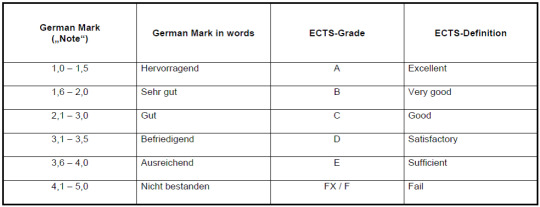
Levels
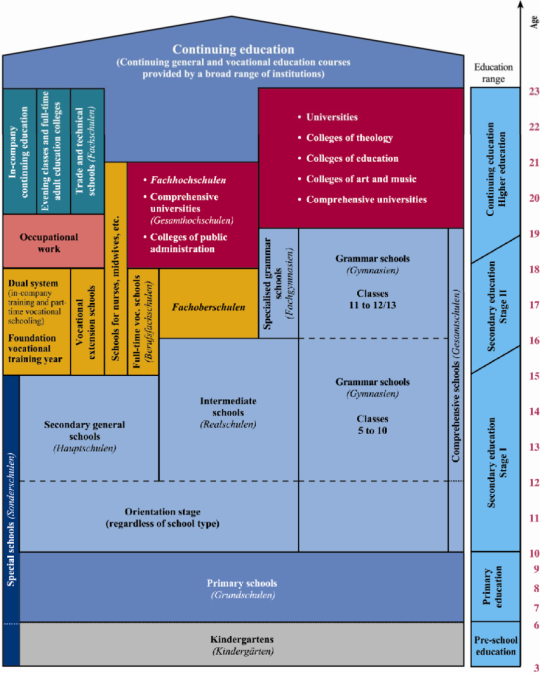
Preschool (Kindergarten)
Preschool education is neither mandatory nor free. Children between the ages of 2 and 6 attend Kindertagesstätte (Kita, “children’s daycare centers”). Many Kitas follow a certain educational approach, such as Montessori or Reggio Emilia.
Primary education (Primarstufe)
Primary education takes place in Grundschulen and generally lasts four years, from 6 to 10 years old. In Berlin and Brandenburg, it lasts six years.
Students are typically taught art, a foreign language (English or French), general studies (natural and social science), German, math, music, physical education, and religion or ethics.
Secondary education (Sekundarstufe)
Secondary education can take place in any of the following schools:
Gymnasium (grammar school) until grade 12 or 13 (ages 10–11 to 17–18/18–19), with Abitur as exit exam to qualify for university
Realschule (intermediate school) until grade 10 (ages 10–11 to 15–16), with Realschulabschluss
Hauptschule (secondary general school) until grade 9 or 10 (ages 10–11 to 14–15/15–16), with Hauptschulabschluss
Gesamtschule (comprehensive school) until grade 10 or 12/13 (ages 10–11 to 15–16 or 17–18/18–19)
The Gymnasium provides in-depth general education for university studies. Hauptschulen teach basic general education leading to vocational school or university entrance qualification. Realschule offers more extensive education than Hauptschule, leading to a vocational or university entrance qualification. A Gesamtschule combines all the aforementioned schools.
There are about twelve compulsory subjects in every grade: biology, chemistry, civics/social/political studies, up to three foreign languages, geography, German, history, math, music, physical education, physics, religion/ethics, and visual arts.
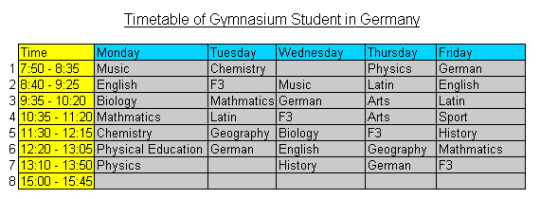
(F3 means Fremdsprache 3 [third foreign language], which is usually French or Spanish)
In grades 11–12/13, each student majors in two or three subjects (Leistungskurse), in which there are usually five lessons per week. The other subjects (Grundkurse) are usually taught three times a week.
Vocational training (Berufsbildung)
Vocational training lasts between two and three and a half years and can take place in any of the following types of school:
Berufsschule (vocational school): the standard type of vocational school, it prepares students for further vocational education or for a job in a profession. Apprentices attend school twice a week and spend the rest of the week working at a company, so they gain knowledge of theory and practice.
Berufsfachschule: similar to Berufsschule, it is aimed at people who want to study specific subjects, such as nursing or occupational therapy.
Fachoberschule (vocational high school): students who have obtained a Realschulabschluss or Hauptschulabschluss can attend a Fachoberschule, where they will specialize themselves in technology, economy, or administration and management, among other subjects. After completing the program, they can study for a university degree after passing the Abitur.
Berufsoberschule (upper vocational school): those who want to attend one need to have graduated from a Berufsschule. It provides in-depth education and training.
Higher education (Tertiärbereich)
To attend university, students need to pass the Abitur exams, of which at least one is oral. They are tested on four or five subjects, including their two or three Leistungskurse and two or three Grundkurse (German, math, and the first foreign language). All knowledge areas must be covered, including language, literature and the arts; social sciences; math, natural sciences and technology, and sports. Each semester of a subject studied in the final two years of Gymnasium yields up to fifteen points, where advanced courses may count double and final examinations count quadruple.
There are 380 universities in Germany, of which 114 are private. Public universities charge fees of around €150–350 per semester, which often include the cost of public transportation. Tertiary education institutions are classified into Universität or Hochschule. The former term is reserved for those which have the right to confer doctorates, in a similar distinction to universities and colleges in the United States. Fachhochschulen (Universities of Applied Sciences) are a type of Hochschule that concentrates on applied science and has a more practical profile with a focus on employability.
There are three types of admissions procedures for degree programs:
Free admissions: every applicant who fulfills the requirements is admitted. This is usually the case in programs in which many students quit, such as engineering, mathematics, or physics.
Local admission restrictions: only a limited number of places are available and students are admitting according to numerus clausus, whose criteria vary depending on the institution and the program but generally include the final grade of the Abitur, a weighted grade average that increases the weight of relevant school subjects, interviews, motivation letters, and/or letters of recommendation.
Nationwide admission restrictions: to study dentistry, medicine, pharmacy, or veterinary medicine, there is a nationwide numerus clausus in which applications are handled centrally for all universities.
There are three official university degrees: Bachelor (bachelor’s degree) takes three years to complete, Master (master’s degree) lasts two years, and Doktorat (doctoral degree or PhD) takes between two and five years.
Students can usually choose freely from all courses offered by the university, but all bachelor’s degree programs require a number of particular compulsory courses in the field of the study program.
62 notes
·
View notes
Text
Der politische Verdruss ist groß. Neulich beschwerte sich ein Freund er würde die Sprache der Politiker nicht mehr verstehen, als würden sie miauen statt Klartext zu reden. Möglicherweise hätten sie es sich tatsächlich von den Katzen abgeschaut. Denn wie kommunizieren die Katzen mit den Menschen? Die Katzen, wie wir wissen, miauen untereinander kaum. Sie miauen nur ein wenig im Babyalter mit ihren Eltern, danach nicht mehr. Erwachsene Katzen benutzen ihre Körpersprache und Duftmarken, sie kommunizieren mit Gerüchen oder mit Knurren. Miauen tun sie nur mit Menschen, als wäre dieses Miauen eine Fremdsprache und dafür da, mit den Vertretern einer anderen Kultur ins Gespräch zu kommen. Doch Menschen miauen untereinander eigentlich auch nicht oder sehr selten. Für sie ist es ebenfalls eine Fremdsprache, die sie nicht verstehen. Sie fühlen sich von den Katzen selbstverständlich angesprochen und miauen aus Höflichkeit zurück, ohne zu wissen, was genau sie gesagt haben. Damit bringen sie die Katzen in Verlegenheit. Mit einer solchen Reaktion haben die Katzen nicht gerechnet, sie verstehen nicht, was die Menschen ihnen mit ihrem Miauen sagen wollen und miauen natürlich weiter. Das wunderliche ist, dass die Katzen mit dieser Methodik tatsächlich manchmal von Menschen bekommen, was sie wollen . Wir haben es hier mit einer Fremdsprache zu tun, die niemandem gehört und die niemand versteht, weder Katzen noch Menschen. Aber irgendwie scheint es für beide Seiten zu funktionieren und alle kommen damit klar. Im Bereich der zwischenmenschlichen Kommunikation haben wir allerdings ein noch gravierenderes Problem: Die Menschen verstehen einander nicht.
Früher waren die Menschen viel weniger informiert, jemand, der auf dem Land lebte, wusste kaum, was im nächsten Dorf geschieht, von irgendeinem Klimawandel ganz zu schweigen. Der Adel wusste vielleicht ein wenig Bescheid, wie es dem anderen Adel im anderen Dorf geht und nur den Königen war es vorbehalten, über das Leben in anderen Königreichen etwas zu wissen und zu beurteilen. Mit der Erfindung des Internets wissen alle alles. Aber die Menschen verstehen es nicht. Wir entwickeln ein Gefühl der Verantwortung für Dinge, die wir nicht verstehen und fühlen uns zuständig für Prozesse, die wir nicht beeinflussen können. Wir wissen alles und können nichts. Klimawandel, Seuche, Krieg, es muss doch sofort etwas unternommen werden! Es gibt in einer solchen Situation zwei gängige Varianten des Handelns: ignorieren oder die Aufgaben weiterleiten, am besten jemanden finden, der etwas kann und ihm sagen, „Mach mir bitte die Klimaerwärmung wieder gut.“ In der Regel ist es das politische Personal, das sich für die Lösungen der unlösbaren Aufgaben anbietet. Nach vier Jahren kann das Personal aber schon in Rente gehen. Tut uns leid, sagt das Personal wir haben alles versucht, mit voller Brust auf die Erde gepustet um feuchte Tücher draufgelegt, es ist nicht kälter geworden. Uns fällt nichts mehr ein. Oder sie fangen an zu miauen, das funktioniert.
9 notes
·
View notes
Photo

Alle mögen Fremdsprachen
easyOriginal-Bücher sind die Alternative zum Pauken, Mühe und Langeweile beim Fremdsprachen lernen!
0 notes
Text

outing myself as a giant dumbass here, but it took me several minutes to figure out what this sentence even means. amtsdeutsch sollte als fremdsprache in der schule gelehrt werden
4 notes
·
View notes
Text
2024 Language Check-in
Today I was staring at my language bookshelf and realized I haven't intentionally studied anything in a long time! I mean, I study languages by myself for my own enrichment, not because I'm any good at them so... it happens. I want to organize this aimless meandering, but first a little recap of what I've studied and what I'd like to improve on.
Let's go 🥁
Spanish
From highschool to now I still can't speak it 😔 I think that's because I struggle to connect with it tbh. I mean it's a practical choice for me and all, but I haven't found something that I'm addicted to that's in Spanish. I have found some books that might be interesting, so... there's that? So just reading books 📚
If you're reading this and know of some cool things in Spanish, then please let me know! Honestly, I'd love to study and immerse in Spanish more. I'll try anything once as long as it isn't too expensive
Korean
My beloved 😍 One day I will speak it with some sort of coherence! Until then I will babble at my favs online lol. Korean is simply a beautiful language and figuring out how it works is fascinating to me.
Goal-wise I'd like to work through the Ewha textbooks that I have and maybe review that one grammar book? I also have a good selection of novels, and other books to immerse in. I do have that bad habit of doing things above my level until I'm too overwhelmed and then not doing anything else for awhile, so... I want to work on that. Have a back up plan of webtoons or something. Definitely the language I am currently enjoying the most
German
I used to study German alongside Korean, but I ended up losing touch with it. I bought a Deutsch als Fremdsprache book awhile ago for review and gap filling, so I'd like to work through that and maybe read one of the children's books I have.
Czech, French, Portuguese, and Swedish are languages that I have dabbled in, but never got too far with. For sure I'd love to learn Czech someday. As well as Japanese, Thai, and so many more. In fact I just ordered some beginner textbooks for Japanese, which started this whole thing. Now that I'm thinking of it, I have textbooks for French, Thai, and Vietnamese as well as the others I previously mentioned. So many languages, so little time!
If you know or are interested in the languages I mentioned here then please reach out. I'd love to talk about languages and language learning with others! I might start making weekly updates or something, idk. I guess we'll all see what I end up doing
7 notes
·
View notes